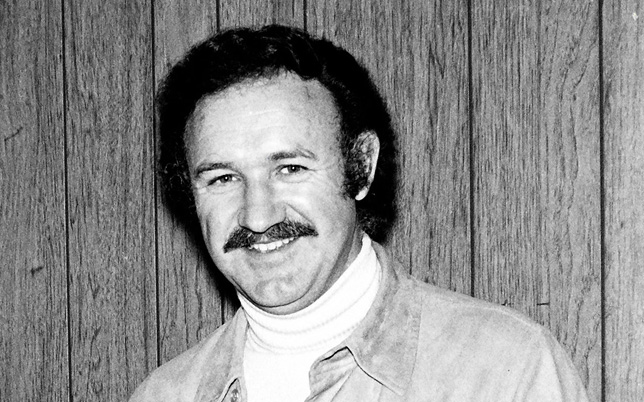
- Industry
Gene Hackman
Gene Hackman, born January 30, 1930 in San Bernardino, California, is one of Hollywood’s finest actors and he played a variety of characters in his 40-year movie career. He studied acting at the Pasadena Playhouse with Dustin Hoffman, where they were voted “least likely to succeed”, then they both moved to New York in the early 1960s to work in the theater with their actor friend Robert Duvall. It was Warren Beatty, who, having acted with Hackman in Lilith (1964) starring Jean Seberg, wanted him to play his outlaw older brother in Bonnie and Clyde (1967) directed by Arthur Penn, the film that first brought him critical acclaim at the age of 37.
Hackman then gave excellent performances that established his status as a movie star in I Never Sang for My Father (1970) with Melvyn Douglas, The French Connection (1971) by William Friedkin, and The Conversation (1974) by Francis Coppola. Interviewed by the journalists of the Hollywood Foreign Press in 1973, Hackman said of Arthur Penn, who would later direct him in Night Moves (1975) and Target (1985), “He is one of the few directors that have a tremendous background in the theater and the old days of live television. Also Arthur has a capacity of eliciting great love and respect from a crew, when you are on a set with him, you always know who’s in charge.” Even back then Hackman understood the dangers of lack of privacy in our society, telling the HFPA: “The Conversation is a very pertinent film right now, it’s about wiretapping and invasion of privacy, I play a man who is involved in electronic surveillance.” He would tackle this subject again in Enemy of the State (1998) by Tony Scott: “We were trying to convey the idea that we don’t have a private life, that the government has the ability to look into our lives and they’re constantly doing that.” From the very beginning Hackman always tried to work with the best actors and directors, who were “at the top of their game.”
His favorite co-stars were Al Pacino in Scarecrow (1973) and Liv Ullman in Zandy’s Bride (1973), and toward the end of his movie career he was finally able to work with his friend Dustin Hoffman in Runaway Jury (2003), his third film based on a John Grisham novel, after The Firm (1993) by Sydney Pollack with Tom Cruise and The Chamber (1996) by James Foley with Faye Dunaway. In 2003 he said to HFPA: “Runaway Jury is the kind of film I really love, because it has to do with solid acting and not running around jumping over fences and things like that. It was terrific working with Dusty. It’s strange that we pick up where we left off every time we meet, we’re very comfortable with each other.”
He enjoyed being directed by Clint Eastwood in the violent Unforgiven (1992), he then starred in another “postmodern” western, The Quick and the Dead (1995) by Sam Raimi with Sharon Stone. Having served in the U.S. Marines at a young age, from 1947 to 1952, he portrayed with assurance a variety of military men, a submarine Captain in Crimson Tide (1995) by Tony Scott with Denzel Washington, a commanding officer in Behind Enemy Lines (2001) with Owen Wilson. He played a news anchorman in Under Fire (1983) by Roger Spottiswoode with Nick Nolte, a high-school basketball coach in Hoosiers (1986) with Barbara Hershey, a government official in No Way Out (1987) by Roger Donaldson with Kevin Costner, an FBI agent in Mississippi Burning (1988) by Alan Parker with Willem Dafoe, a lawyer in Class Action (1991) by Michael Apted. Best known for his forceful dramatic roles, Hackman showed his flair for comedy in Young Frankenstein (1974) by Mel Brooks with Gene Wilder, Postcards from the Edge (1990) by Mike Nichols, Get Shorty (1995) by Barry Sonnenfeld with John Travolta, The Birdcage (1996) by Mike Nichols, The Heartbreakers (2001) with Sigourney Weaver, The Royal Tenenbaums (2001) by Wes Anderson with Anjelica Huston.
Hackman felt the stress of working on movie sets and retired a couple of times, once after playing Lex Luthor in Superman (1978) by Richard Donner with Christopher Reeves, it was his friend Warren Beatty who lured him back for Reds (1981), then following an angina attack in 1990. The father of two grown daughters and a son, Elizabeth, Leslie and Christopher, with his first wife Faye (1956-1986), he finally retired for good in 2004, moving to Santa Fe, New Mexico with his second wife Betsy, where he paints and has written three novels.
He told the HFPA in 2003: “My wife and I live up in the mountains and we stay pretty much to ourselves. I either write during the day or I paint, we meet for lunch maybe two or three times a week downtown. We have a wine cellar and we enjoy drinking a bottle of wine every night. We laugh a lot at home, I would say that probably our days are filled with 90% amusement.” The Hollywood Foreign Press Association honored Gene Hackman with 3 Golden Globes and 8 nominations. He won as Best Actor for The French Connection in 1972, as Supporting actor for Unforgiven in 1993 and The Royal Tenenbaums in 2002. He was nominated for The Conversation in 1975, French Connection II in 1976, Under Fire in 1984, Twice in a Lifetime in 1986, Mississippi Burning in 1989. In 2003 he was chosen for the Cecil B. deMille lifetime achievement award.